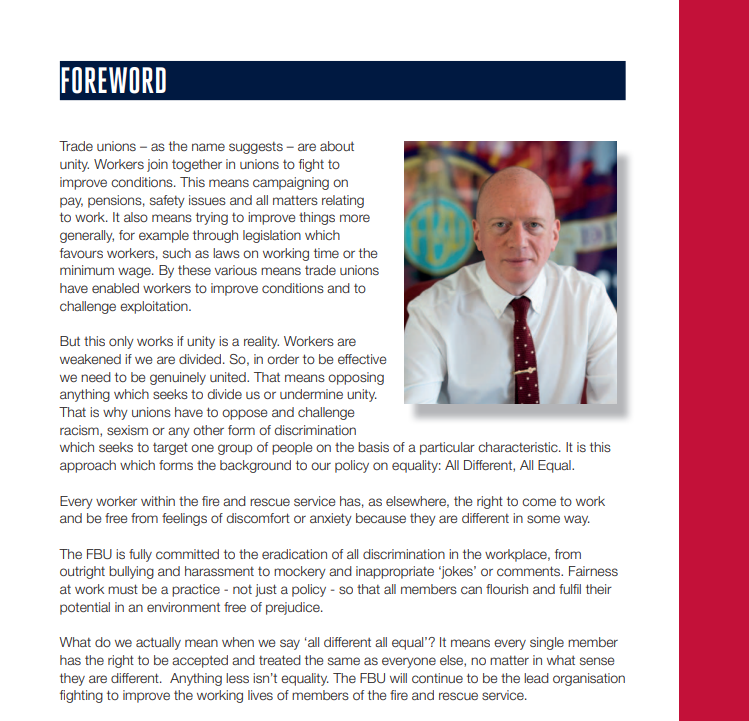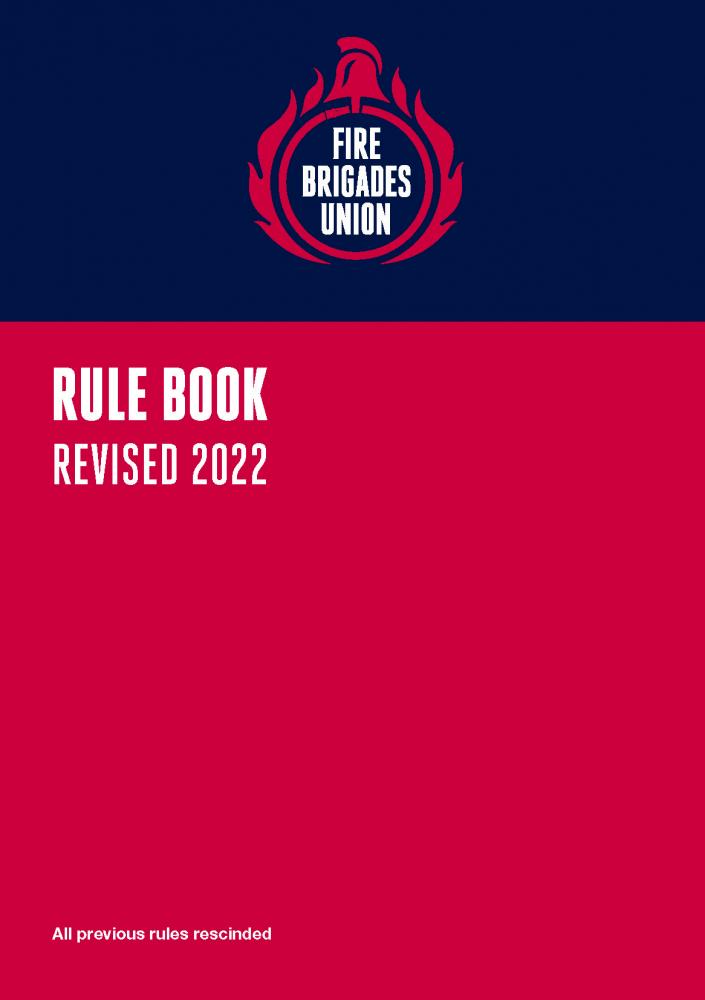A MAJOR CONTROVERSY has broken out in the Fire Brigades Union (FBU) after disciplinary proceedings into allegations that the general secretary, Matt Wrack, and national officer Riccardo la Torre broke union rules were abruptly terminated just days before the pair were due to face a hearing.
The full details, which can be disclosed for the first time by this blog, leave Wrack, la Torre, assistant general secretary Ben Selby and members of the ruling executive council facing extremely serious questions, amid accusations that they have created a two-tier system of discipline within the union.
The affair threatens to cause political and administrative chaos inside the FBU, with the union’s most senior officials – the people with the highest level of responsibility for upholding the organisation’s rules and policies – now potentially placed beyond the scope of rule book discipline.
This blog today shines a light on what has gone on. In particular, we can reveal how:
- Wrack and la Torre were facing serious allegations that they had breached a flagship policy of the union.
- The investigating official – the union’s vice-president – produced a report which concluded that the allegations were well-founded and that Wrack and la Torre should face a disciplinary hearing.
- A hearing was scheduled to take place on 22 February.
- Nine days before the hearing, the union’s assistant general secretary, Ben Selby – a key ally of Wrack and la Torre – presented the executive council with ‘highly confidential’ legal advice. After considering this advice, the executive council voted to terminate the disciplinary proceedings and cancel the hearing. The executive council had no power under the rule book to do this.
- The vice-president has never withdrawn his report or conclusions, and the decision to terminate the proceedings was made in his absence.
These disturbing revelations are likely to cause deep concern and anger among FBU members and officials. One insider told this blog last night, ‘No-one in the union has ever seen anything like it. At a stroke, the FBU’s rule book has been torn up – all to protect Wrack and la Torre from a disciplinary hearing. It’s like they’ve been given the equivalent of diplomatic immunity inside the union. It stinks.’
The disciplinary investigation began in early January after a complaint was made that a key policy of the union – known as ‘All Different, All Equal’ – had been bypassed by Wrack and la Torre when it was decided that the latter would receive union assistance (including thousands of pounds worth of funding) to fight a private legal claim brought against him by a member about whom he had made libellous comments on social media (la Torre falsely accused the member of having stolen IT equipment belonging to the union).
‘All Different, All Equal’ is the FBU’s flagship policy on fairness and equality, and sets out how the union handles requests for assistance from members or officials who are accused – as la Torre was – of having committed an act of bullying, harassment or discrimination.
Under the policy, la Torre was required to make an application for any union assistance, at which point an investigation would have taken place to determine whether he had what is known as an ‘arguable defence’. If it was decided that he had no such defence, assistance would have been denied.
Wrack, as the general secretary, was required under the policy to ensure that the correct process was followed.

However, it was alleged that both Wrack and la Torre ignored their obligations under the policy, and therefore no investigation was carried out to determine whether la Torre was entitled to the substantial assistance he was receiving. This alleged failure was all the more remarkable for the fact that la Torre holds the responsibility for ‘fairness at work’ as part of his national officer duties and has previously been involved in administering the policy, and Wrack wrote the foreword to the policy setting out the significance of it. Indeed, as recently as last year, Wrack was emphasising to the union’s annual conference the importance of making sure the policy was applied consistently across the organisation.
In line with the union’s rule book, the complaint alleging that Wrack and la Torre had breached the policy was investigated by the union’s vice-president, Steve Wright.
Wright’s report concluded that the complaint was well-founded and that Wrack and la Torre should face a disciplinary hearing. Wright sent his final report to the assistant general secretary, Ben Selby – who, in line with the rule book, brought it to the attention of the executive council – and a date of 22 February was fixed for the hearing.
This blog has not seen Wright’s report. However, a well-placed source told us that the report was ‘very thorough and professional’, and everything Wright did throughout the investigation was perfectly consistent with the section of the rule book that sets out the procedure for disciplinary action against full-time officials such as Wrack and la Torre.

However, at a meeting on 13 February – just nine days before the planned hearing – Selby suddenly presented executive council members with ‘highly confidential’ legal advice. This advice was reportedly obtained at the request of Wrack.
The executive council meeting was called when Wright was on leave, so he was not able to attend. Nobody outside of that executive council meeting has been allowed to see the legal advice – meaning that the substance of it remains shrouded in mystery.
After a discussion about the advice, the executive council voted to terminate the disciplinary proceedings – meaning that the hearing would no longer take place. Under the rule book, the executive council had no power to take that action. While the rule book does grant the executive council some discretionary powers to take such action as it deems necessary for the conduct of the union’s affairs, it also states very clearly – at rule C3(6) – that those powers are limited by existing rules. And, under existing rules, once the vice-president has delivered a report concluding that rules have been broken, a hearing must take place.
Plainly, if Wrack and la Torre wished to rely on the legal advice as part of their defence case, they (or their representatives) should have adduced it as evidence at the planned disciplinary hearing. That was the proper place for the advice to be considered and tested. Instead, and in complete contravention of the rules, the complaints against the pair were struck out and the hearing scrapped.
No FBU member or official could ordinarily expect to be granted the right to use the mechanisms of the union to enlist the help of lawyers in an attempt to persuade the executive council to cancel a disciplinary hearing they had been instructed to attend under the union’s rules. Yet, for some reason, this right was granted to Wrack and la Torre.
The executive council’s decision to terminate the disciplinary proceedings and cancel the hearing carries all sorts of unthinkable consequences. It effectively means that the principle that all members and officials are considered equal under the rule book is dead in the water. Instead, a precedent has been set whereby the union’s most senior officials are afforded some form of special protection against rule book disciplinary procedures and are able to subvert those procedures by obtaining ‘helpful’ legal advice that no-one beyond the executive council is entitled to see.
It is hard to see this development as anything less than a serious violation of the principles of equality, natural justice and democratic accountability inside the union. It tells us that some senior officials see themselves as separate to everyone else in the organisation and worthy of some kind of special treatment. It tells us they believe that the private and untested views of unaccountable lawyers should take precedence over the long-established democratic rules of the union. And, in turn, that tells us that these officials have utterly lost sight of what being part of a trade union is all about.
Everyone should be equal under the rule book, from the general secretary to the newest member. No-one is bigger than the union. Yet now we apparently have one rule for the union’s leadership and another for everyone else.
Under the rules, Wrack and la Torre should have faced a disciplinary hearing. End of story. They would have had every right at that hearing to put their defence, and they may even have been able to convince those sitting in judgement that they were not guilty of the allegations levelled against them. But the hearing did not take place because the executive council was persuaded to break the rules on their behalf. Such an outcome will leave members wondering what is the point of having agreed rules if senior officials are allowed to circumvent them so easily.

Relatedly, the decision of the executive council potentially leaves a gaping hole in the FBU rule book, and creates huge uncertainty on the question of how full-time officials such as Wrack and la Torre could ever be subjected to internal discipline in the future. That is a situation that must be addressed urgently. If the executive council is not careful, a constitutional mess could quickly become constitutional anarchy.
Furthermore – and in the interests of democracy, accountability and transparency – the executive council must release the legal advice upon which it relied when deciding to terminate the disciplinary proceedings. Let members know why the proceedings were halted, and let there be a debate on the merits of the advice. These vital matters should not be determined in secret by a handful of the union’s most senior officials and faceless lawyers.
Additionally, proper reports about these events should be provided by executive council members to their regional committees and then filtered down through the official structures of the union. It is not acceptable that discussion is limited to the rumour mill. Members are entitled to have a proper and informed debate about the likely grave consequences of this episode – including any potential impact on the union’s rules and the implications for democratic accountability – and to decide their response accordingly.
The executive council’s unprecedented actions must be seen as the beginning of a debate, not the end of one. For what we are witnessing is a brazen attempt by the union’s most senior officials to secure some sort of opt-out from the same disciplinary procedures that everyone else in the union is expected to abide by, and to avoid being held accountable under the rule book for their actions. On the one hand, that smacks of desperation. On the other, it smacks of the most arrogant elitism.
We as FBU members deserve so much better than this.

